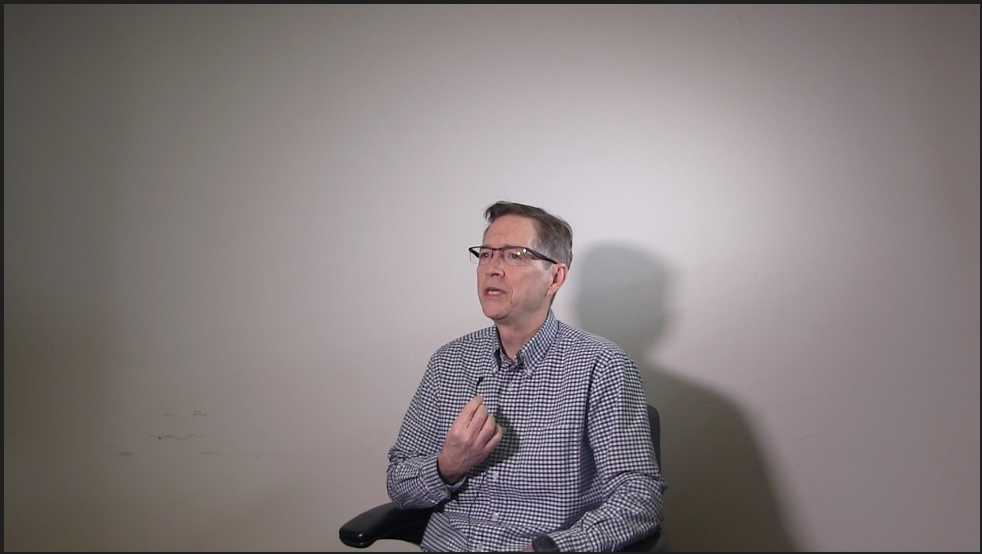New Gas Chromatography Products for 2018–2019
LCGC North America
Our annual review of new developments in the field of gas chromatography, as seen at Pittcon and other venues
The 70th session of the Pittsburgh Conference on Analytical Chemistry and Applied Spectroscopy (Pittcon) was held March 17–21, 2019 at the Philadelphia Convention Center in Philadelphia, Pennsylvania. As was the case last year, the conference and exhibition were a day shorter than previous meetings. The reduced time added some intensity to the experience, which I certainly felt as I hiked from exhibitions to presentations and back while trying to cover both sides of the conference. There were over 2000 technical presentations this year, given in more than two hundred sessions, including symposia, invited talks, oral sessions, posters, workshops, and award sessions. Attendance at this year's Pittcon was up about ten percent from Orlando last year, with a total of 12,541 from 94 countries, more than 900 of whom attended one or more of 75 Pittcon short courses. The exposition had 713 exhibitors-101 of them for the first time-from 27 countries, in a total of 1234 booths.
The conference celebrated its septuagennial (70th) anniversary with cake and cupcakes for all. I enjoyed some of the other activities in the Pittcon Park Demo Zone, particularly the portable planetarium show that benefited the Parent Education and Advocacy Leadership (PEAL) Center, raising awareness for autism and other disabilities.
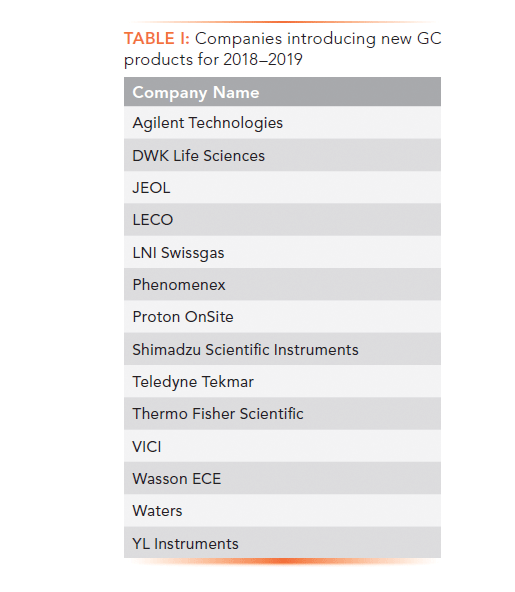
The 2019 LCGC Lifetime Achievement in Chromatography Award was presented to Milos Novotny (Indiana University) (1), and the 2019 LCGC Emerging Leader in Chromatography Award went to Ken Broeckhoven (Vrije Universiteit Brussel, Belgium) (2).
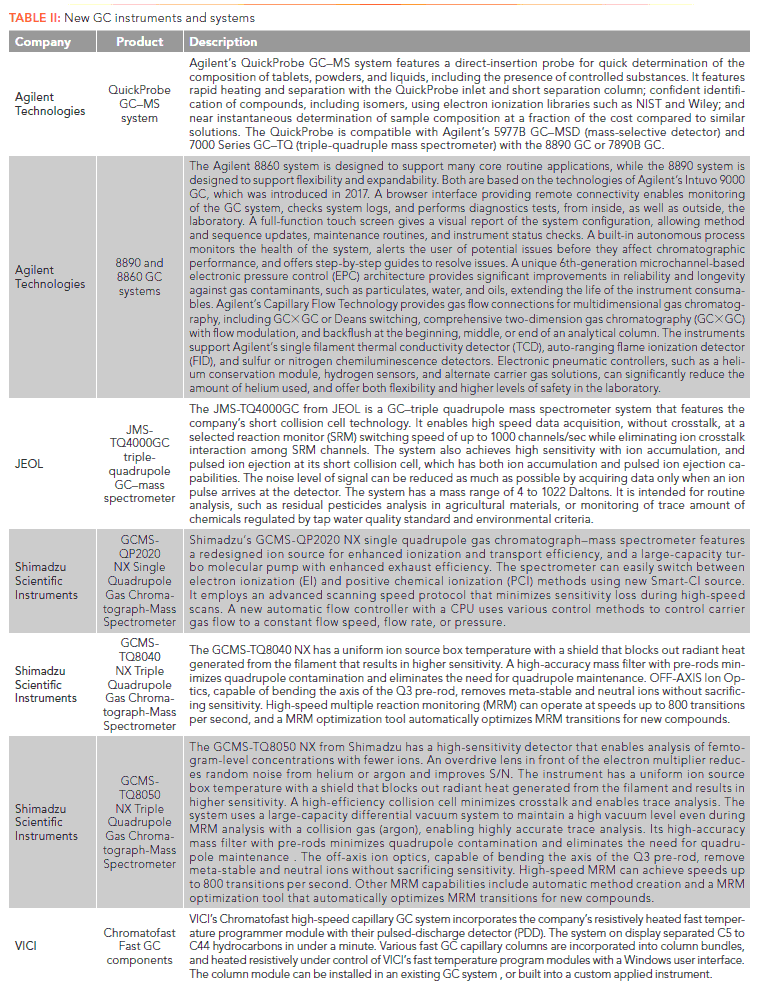
The next Pittcon is set for a Chicago reunion March 1–5, 2020, at McCormick Place, as in past years in the Windy City. The conference will then circle around to New Orleans for the 2021 event.
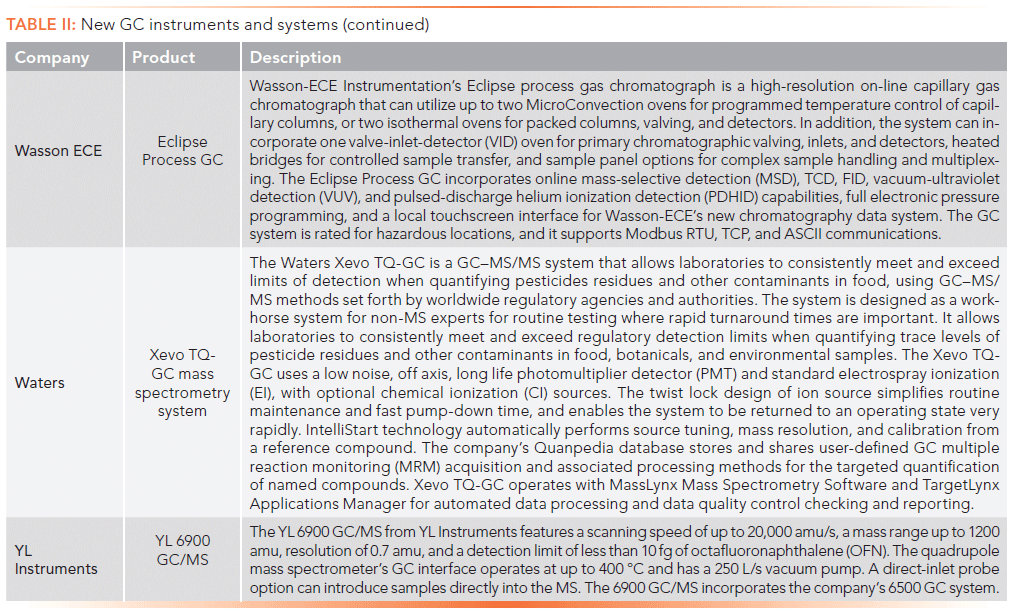
This annual "GC Connections" installment reviews gas chromatography (GC) instrumentation, columns, and accessories shown at this year's Pittcon, or introduced during the previous year. Table I shows a list of the companies that introduced new GC products since Pittcon 2018, and Tables II–IV present details on new instruments, systems, accessories, and columns. For reviews of new products in other areas of chromatography, columns, and related accessories, please see the "Column Watch" and "Perspectives in Modern HPLC" columns in the April 2019 issue of LCGC North America (3,4), and the "Sample Prep Perspectives" column in this issue (5).
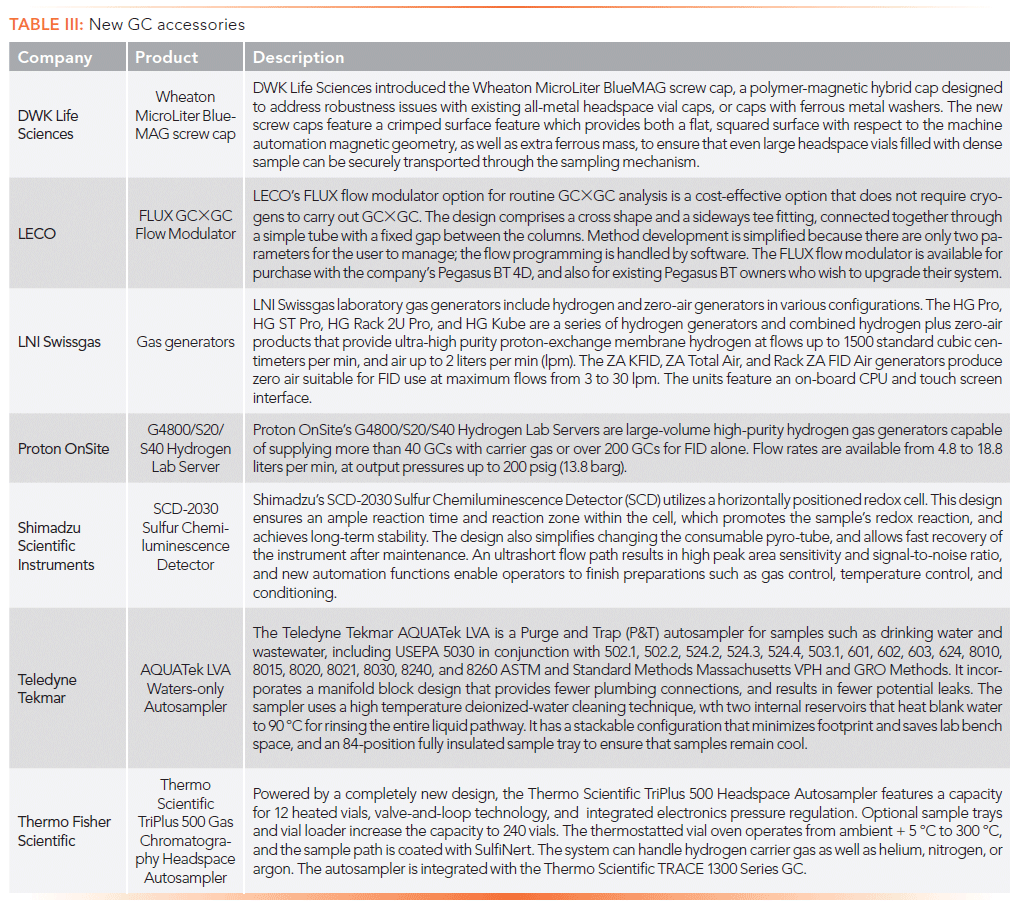
The information presented here is based on manufacturers' replies to questionnaires, as well as on additional information from manufacturers' press releases, websites, and product literature about the past year's products, and not upon actual use or experience of the author. Every effort has been made to collect accurate information, but because of the preliminary nature of some of the material, LCGC North America cannot be responsible for errors or omissions. This column installment cannot be considered to be a complete record of all new GC products introduced in the past year, because not all manufacturers chose to respond to the questionnaire, nor is all of the submitted information necessarily included here, because of the limited available space, and the editors' judgment as to its suitability.

GC: 2018–2019
The past year saw a significant number of new GC and GC-related product introductions. Continuing to be even more active than the previous year, the GC instrument realm gained at least 11 new GC and GC–MS systems in 2018–2019.
Agilent updated its line with the 8860 and 8890 benchtop GC instruments, and added the Quick-Probe direct insertion probe to the 5977B GC/MSD system and the 7000-series GC/Triple-Quad MS system. JEOL introduced their JMS-TQ4000GC triple-quadrupole GC–mass spectrometer, while Shimadzu brought along three GC–MS products: the GCMS-QP2020 NX single quadrupole GC–MS, the GCMS-TQ8040 NX, and the GCMS-TQ8050 NX triple quadrupole GC–MS systems. Rounding out the GC–MS category was the Xevo TQ-GC mass spectrometry system from Waters, and the YL 6900 GC/MS from YL Instruments. In the fast GC realm, Wasson-ECE launched the Eclipse Process GC system with high-resolution capillary GC column capabilities, and VICI continued to expand and enhance its Chromatofast fast GC components with an in-booth demonstration of C4–C44 hydrocarbon separation in under 1 min.
Multiple autosamplers and accessories for GC systems appeared this year, including the Teledyne-Tekmar AquaTek LVA water-sample purge-and-trap autosampler, and a new headspace autosampler from Thermo Fisher Scientific, the TriPlus 500. From DWK Life Sciences, a new headspace vial cap promises to improve reliability with samplers that use magnetic vial transport. The new Flux flow modulator for GC×GC from LECO replaces cryofocusing with fluidic flow switching for the critical sample hold-and-inject function at the column junction. Shimadzu's SCD-2030 sulfur chemiluminescence detector incorporates some innovative improvements, including a horizontal redox cell. In addition, the laboratory gas generator field gained a series of hydrogen generators from Proton OnSite that can serve an entire laboratory's needs, while LNI SwissGas introduced its hydrogen and zero-air generators in both benchtop and rack configurations, with some offerings that include both hydrogen and zero-air generation in the same unit. Finally, the Phenomenex Zebron ZB-614Plus GC column won a Pittcon Today Silver Excellence Award.
GC has seen significant innovations and developments in the past year. Still developing areas such as fast capillary GC and GC×GC continue to attain increased acceptance, while established techniques for regulated methods such as GC–MS, headspace, and purge-and-trap have received much attention toward making the methods more reliable, robust, and user-friendly in today's laboratory environments. I am looking forward to discovering the next year's worth of innovation and development in this field at the next Pittcon in Chicago.
Acknowledgments
I would like to thank the manufacturers and distributors that kindly furnished the requested information, which allowed a timely report on new product introductions over the past year. For those manufacturers who did not receive a "New Products" questionnaire this year and would like to receive one and be considered for early inclusion into the 2020 new GC and related product introductions review, as well as the other related review articles to be published in LCGC, please send the name of the primary company contact plus the mailing and e-mail addresses to Laura Bush, Editorial Director of LCGC and Spectroscopy, at LBush@MMHGroup.com. The questionnaire will be sent out later in 2019.
References
(1) J. Workman, Jr, LCGC North Am. 37(3), 210–212 (2019).
(2) J. Workman, Jr, LCGC North Am. 37(3), 204–208 (2019).
(3) D.S. Bell, LCGC North Am. 37(4), 232–243 (2019).
(4) M.W. Dong, LCGC North Am. 37(4), 252–259 (2019).
(5) D.E. Raynie, LCGC North Am. 37(5), 298–302 (2019).
John V. Hinshaw

John V. Hinshaw "GC Connections" editor John V. Hinshaw is a Senior Scientist at Serveron Corporation in Beaverton, Oregon, and a member of LCGC's editorial advisory board. Direct correspondence about this column to the author via e-mail: LCGCedit@ubm.com
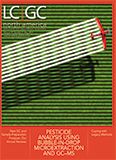
New Study Reviews Chromatography Methods for Flavonoid Analysis
April 21st 2025Flavonoids are widely used metabolites that carry out various functions in different industries, such as food and cosmetics. Detecting, separating, and quantifying them in fruit species can be a complicated process.
University of Rouen-Normandy Scientists Explore Eco-Friendly Sampling Approach for GC-HRMS
April 17th 2025Root exudates—substances secreted by living plant roots—are challenging to sample, as they are typically extracted using artificial devices and can vary widely in both quantity and composition across plant species.
Sorbonne Researchers Develop Miniaturized GC Detector for VOC Analysis
April 16th 2025A team of scientists from the Paris university developed and optimized MAVERIC, a miniaturized and autonomous gas chromatography (GC) system coupled to a nano-gravimetric detector (NGD) based on a NEMS (nano-electromechanical-system) resonator.

.png&w=3840&q=75)

.png&w=3840&q=75)



.png&w=3840&q=75)



.png&w=3840&q=75)











